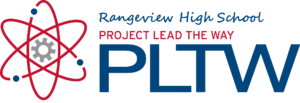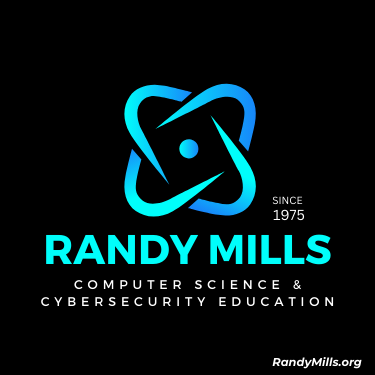Rangeview PLTW Information
Scholarships Available
- Cybersecurity Scholarships
- Scholarships.com - Cybersecurity Scholarships
- CyberCorps Scholarship Program

Whether a student is curious to understand more about engineering, has decided to pursue it as a career, or simply wants to think critically, work collaboratively, and explore how math and science work in his or her everyday life, PLTW’s Pathway To Engineering (PTE) Program provides a track for success. Students engage in open-ended problem solving, learn and apply the engineering design process, and develop vital teamwork, communication, and critical-thinking skills. Throughout the courses, students use the same industry-leading technology and software as the world’s top companies. The exciting and challenging fields of engineering come alive in the PTE program, which is designed to prepare students for careers or post-secondary study in STEM fields.
PROJECT LEAD THE WAY COURSES
PATHWAY TO ENGINEERING COURSE OFFERINGS
Introduction to Engineering Design
In this course, students use 3D solid modeling design software to help them design solutions to solve proposed problems. Students will learn how to document their work and communicate solutions to peers and members of the professional community. This course is designed for 9th-grade students. The major focus of the IED course is to expose students to the design process, research and analysis, teamwork, communication methods, global and human impacts, engineering standards and technical documentation.
Principles of Engineering
This survey course of engineering exposes students to some of the major concepts they’ll encounter in a postsecondary engineering course of study. Students have an opportunity to investigate engineering and high-tech careers and to develop skills and understanding of course concepts. Students employ engineering and scientific concepts in the solution of engineering design problems. They develop problem-solving skills and apply their knowledge of research and design to create solutions to various challenges. Students also learn how to document their work and communicate their solutions to peers and members of the professional community. This course is designed for 10th or 11th-grade students.
Digital Electronics
This course is the study of electronic circuits that are used to process and control digital signals. Digital electronics is the foundation of all modern electronic devices such as cellular phones, MP3 players, laptop computers, digital cameras and high-definition televisions. The major focus of the DE course is to expose students to the process of combinational and sequential logic design, teamwork, communication methods, engineering standards and technical documentation. This course is designed for 10th or 11th-grade students.
Aerospace Engineering
The major focus of this course is to expose students to the world of aeronautics, flight and engineering through the fields of aeronautics, aerospace engineering and related areas of study. Lessons engage students in engineering design problems related to aerospace information systems, astronautics, rocketry, propulsion, the physics of space science, space life sciences, the biology of space science, principles of aeronautics, structures and materials, and systems engineering. Students work in teams utilizing hands-on activities, projects, and problems and are exposed to various situations faced by aerospace engineers. In addition, students use 3D design software to help design solutions to proposed problems. Students design intelligent vehicles to learn about documenting their project, solving problems and communicating their solutions to their peers and members of the professional community. This course is designed for 11th or 12th-grade students.
COMPUTER SCIENCE COURSE OFFERINGS
 Rangeview has had the honor of serving as Alpha testers for the Cybersecurity and Computer Science Principles. Randy Mills work with PLTW to form the new Cybersecurity class in 2017-18 and Bill Petry has been working with CSP revision for the 2019-2020 school year.
Rangeview has had the honor of serving as Alpha testers for the Cybersecurity and Computer Science Principles. Randy Mills work with PLTW to form the new Cybersecurity class in 2017-18 and Bill Petry has been working with CSP revision for the 2019-2020 school year.
Computer Science and Software Engineering
PLTW Computer Science and Software is a new addition to the STEM curriculum. It is designed for students interested in pursuing a postsecondary career in the computer sciences. The course is built upon four core subject areas: graphics, the web, data mining, and modeling. Students will learn how to build complex websites that collect, store, and exchange date, create Android applications, understand Internet security, and build computer models and simulations.
CyberSecurity
Cybersecurity introduces the tools and concepts of cybersecurity and encourages students to create solutions that allow people to share computing resources while protecting privacy. Nationally, computational resources are vulnerable and frequently attacked; in Cybersecurity, students solve problems by understanding and closing these vulnerabilities. This course raises students’ knowledge of and commitment to ethical computing behavior. It also aims to develop students’ skills as consumers, friends, citizens, and employees who can effectively contribute to communities with a dependable cyber-infrastructure that moves and processes information safely.
Computer Science A
Computer Science A focuses on further developing computational-thinking skills through the medium of Android™ App development for mobile platforms. The course utilizes industry-standard tools such as Android Studio, Java™ programming language, XML, and device emulators. Students collaborate to create original solutions to problems of their own choosing by designing and implementing user interfaces and Web-based databases. This course aligns with the AP CS A course.
Computer Science Principles
Using Python® as a primary tool and incorporating multiple platforms and languages for computation, this course aims to develop computational thinking, generate excitement about career paths that utilize computing, and introduce professional tools that foster creativity and collaboration. Computer Science Principles helps students develop programming expertise and explore the workings of the Internet. Projects and problems include app development, visualization of data, cybersecurity, and simulation. PLTW is recognized by the College Board as an endorsed provider of curriculum and professional development for AP® Computer Science Principles (AP CSP). This endorsement affirms that all components of PLTW CSP’s offerings are aligned to the AP Curriculum Framework standards and the AP CSP assessment.
PLTW Instructors:
Tom Brown
Randy Mills - PLTW Master Teacher
Bill Petry - PLTW Master Teacher
Kyle Riggins
